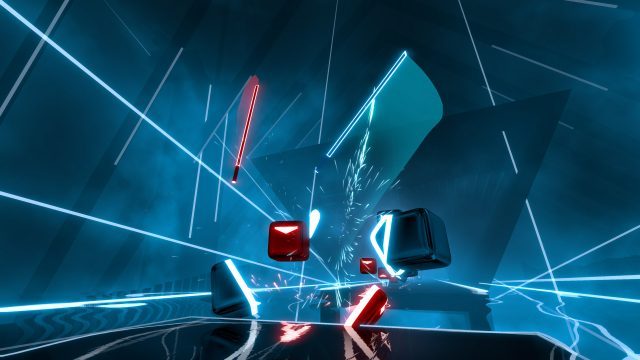As VR’s best-selling title, Beat Saber is showing no signs of slowing down. Today Facebook, which now owns the studio behind the game, announced that Beat Saber has sold more than 2 million copies and 10 million songs via DLC.
Beat Saber is the closest thing VR has seen yet to a ‘killer app’, now with 2 million units sold across all platforms (that includes Oculus PC, Quest, PSVR, and SteamVR). The game has also sold 10 million songs via paid DLC, Facebook said today on the official Oculus blog. The game has licensed songs from well known artists for paid DLC packs from the likes of Imagine Dragons, Green Day, Panic at the Disco, and more, including a made-for-Beat Saber album from Timbaland launching next week.

After initially launching in Early Access in May, 2018, Beat Saber studio Beat Games announced that it had reached the 1 million unit milestone 10 months later in March, 2019; today’s 2 million unit milestone comes just one year later, showing that sales of the game have hardly slowed down.
A coarse estimate suggests the game has generated some $67 million in revenue; here’s how we figure:
- 1 million copies sold at the early access price of $20
- 1 million copies at the retail price of $30
- 5 million songs bought individually at $2 each
- 5 million songs bought bundled at $1.50 each (an average 25% discount)
This is a rough estimate of how much revenue the game has generated and doesn’t account for regional pricing and platform cuts.
Either way, it’s a huge number for a VR game, and one that demonstrates the size of the VR audience and what scale developers could potentially reach. In the grand scheme of things, 2 million units is a small number compared to the non-VR gaming market, where highly anticipated titles can sell millions of units in their first day, but for a VR game like Beat Saber—which was born out of a two-person indie studio—it’s still a major success at its own scale.
The game has done so well, and been so important to VR, that Facebook acquired Beat Saber studio Beat Games back at the end of 2019.
While Beat Saber is the leading example of success in this space, the VR audience—and the developer ecosystem they support—appears to be growing healthily. When it launched at the end of 2019, Boneworks saw surprising success in its first week of sales, and actually outpaced Beat Saber to 100,000 units despite being available on only one of VR’s key platforms. Elsewhere, Oculus confirmed earlier this week that more than 20 games on Quest have reached more than $1 million in revenue, a milestone which saw a major uptick in the broader VR space in 2019.
Source: Read Full Article